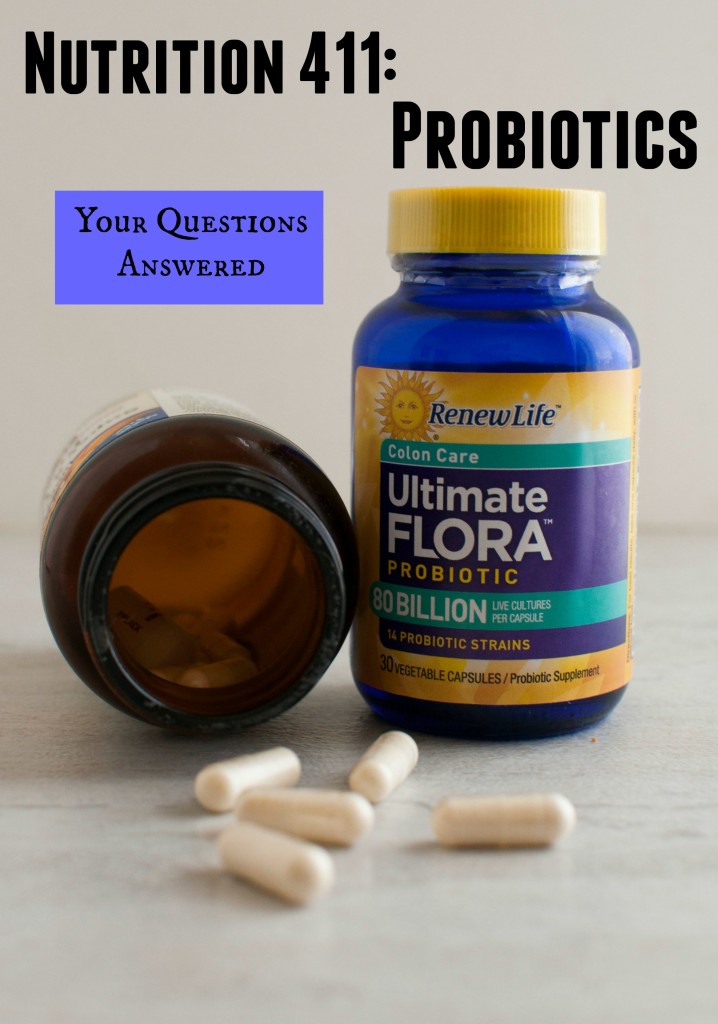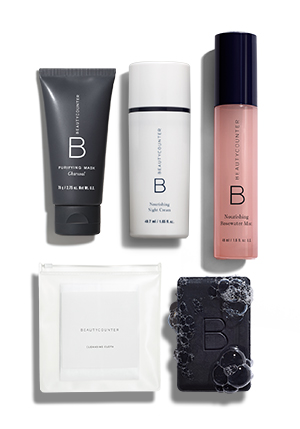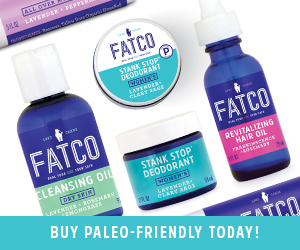13 May, 2016
Nutrition 411: Probiotics (Your Questions Answered)

Probiotics are hot right now and for very good reason. This isn’t a fad but a very critical aspect for optimal health. I get asked quite often if everyone should take a probiotic or if eating fermented foods is enough to keep our good gut bacteria in check. Unfortunately the answer isn’t always black and white. I also think it is important to mention right off the bat that if you continue feeding your pathogens in the gut with sugar and processed carbohydrates (refined foods) then a probiotic may not have much chance of helping you. Real food and good gut health go hand in hand.
Why are Probiotic Needs on the Rise?
Antibiotics have been an essential part of modern science and medicine. These drugs have saved millions of lives. However, the misuse of antibiotics has led to some serious problems. According to the CDC 18 million courses of antibiotics per year are prescribed to people for the common cold and 50 million for viral respiratory infections. This is despite the universal knowledge that these come from viral causes and not bacterial. Antibiotics don’t know the good bacteria from the bad. Especially broad-spectrum antibiotics, can seriously disrupt the normal ecology of the body and render anyone more susceptible to pathogenic (disease causing) bacteria, yeast, viruses and infections. Now think about how many times you have been on an antibiotic in your life and didn’t take the steps to rebuild your good gut bacteria.
Pill popping isn’t the only way we have become exposed to antibiotics so even if you are part of the lucky ones that has never taken prescription antibiotics. About 80% of the antibiotics produced in the U.S. are given to farm animals. Farmers and ranchers feed small amounts of the drugs to animals over their lifetimes to keep them healthy in crowded conditions, causing possible antibiotic-resistant bacteria to be passed onto people through the environment and eating meat from the animals.
Other possible causes of altered gut bacteria can range from environmental toxins, stress, processed foods, high sugar diets, our genes, or even how healthy your mothers gut bacteria was when you were born.
Probiotics vs. Fermented Foods
Maintaining a good gut flora and replenishing your gut with good bacteria may be one of the most important steps you can take for better health (80% of our immune system is in our gut). If you aren’t eating fermented foods and eating a lot of processed foods then you definitely should consider a probiotic daily (as well as start taking steps to eating more real food). Other reasons you may want to consider a probiotic supplement might be if you suffer from Irritable Bowel Syndrome (IBS), Crohn’s Disease, ulcerative colitis, allergies, eczema, autism, international travel, depression, and acne just to name a few.
It’s worth noting that each mouthful of fermented food can provide trillions of beneficial bacteria—far more than you can get from a probiotics supplement, which will typically provide you with bacteria in the billions. Fermented foods also give you a wider variety of beneficial bacteria, so all in all, it’s a more cost effective alternative. Fermenting your own foods can provide even greater savings, and is actually easier than you might think. Eating food that is fermented has also been shown to improve the nutritional quality of the food, making certain nutrients more bioavailable and creating stronger antioxidant properties.
Fermented foods are naturally full of probiotics and prebiotics in the form of fiber and sugars. If you haven’t yet balanced your gut bacteria- if you have an overgrowth of yeast or are suffering from SIBO- fermented foods can actually feed the bad bacteria. In this case fermented foods may actually make the problem worse. Once your gut is healed, then you can slowly introduce fermented foods. Another population that may not tolerated fermented foods are those with a histamine intolerance.
Do I Need a Probiotic Supplement?
Probiotics aren’t the cure all that everyone things they are and may not actually fix your digestive issues. True gut healing goes way beyond just taking a probiotic supplement. But if you aren’t eating fermented foods, maybe you are traveling and don’t have access to these beneficial foods, you need a good probiotic boost (such as after a round of antibiotics or as part of a gut healing protocol) or you have chosen to incorporate both into your life then what should you know about using probiotics? This is a question that I get asked a lot and it can be overwhelming.
You Asked…I Answered
Can you give probiotics to children? Should they be taking them daily or just when experiencing illness? According to the Bio-Kult website, “Live bacteria have been shown to positively influence the infant’s gut flora balance and developing immune system, showing promising results in the prevention and management of infectious diarrhoea and allergies in particular. Live bacteria given to infants from birth seem to increase resistance to common coughs and colds and reduce the need for antibiotic use. As with many studies, results vary and live bacteria supplementation often appear to be more effective as prevention opposed to treatment.” Children need a lower dose then adults and formulas designed specifically for children are widely available. I got the below dosage information from a GAPS website but I think it may be a good place to start (as always check with your doctor).
- An infant up to 12 months of age can have 1-2 billion of bacterial cells per day.
- A toddler from 1 to 2 years of age can have 2-4 billion of bacterial cells per day.
- A child from 2 to 4 years of age can handle 4-8 billion of bacterial cells per day.
- A child from 4 to 10 years of age can have 8-12 billion of bacterial cells per day.
- From the age of 12 to 16 we can increase the dose to 12-15 billion per day.
Should I stop taking probiotics if I don’t notice a difference? I believe this is more of a personal choice. If I have clients that are working on healing their gut I am going to want to dig deep to figure out why they are experiencing digestive issues. We usually start with a comprehensive stool test like the GI MAP to look for pathogens that need addressing. You may try a few different brands of probiotics if you aren’t noticing any benefits such as improved eliminations. Different brands may contain different bacteria and some experimenting may be needed to find what works best for you. If you are a generally healthy individual, eating a real food diet and consuming fermented foods daily then you may not even need a probiotic supplement if you aren’t noticing and benefits. The proof is in the poop. And if you continue with gut issues then it might be time to work with a professional to help get to the root cause.
Are refrigerated probiotics better? Bacteria are easily damaged by heat, oxygen, acid, and moisture. These are the challenges faced when manufacturing a probiotic supplement. They first must be grown, harvested, packaged and delivered to the customer while keeping the bacteria alive. Then they have to survive the acidic stomach to get to the intestines. That being said refrigerated isn’t necessarily better. Processing methods have come a long way and manufacturers are finding many different methods to deliver viable bacteria. The method of shelf stable Bio-Kult involves live bacteria themselves being encapsulated (with a protective coating) during a freeze drying process (lyophilisation). This process aids in the protection of the bacteria while on the shelf and from the harsh acidic environment of the stomach. Spore and soil based probiotics also generally don’t need refrigeration.
Some practitioners believe that if the probiotic needs to be refrigerated, it has less chance of remaining intact by the time it gets to where it needs to go in your digestive system. Finding the right one for you may mean a little experimenting. Try both and see if you notice a difference.
Is it normal to feel sick for a period of time when taking probiotics? Yes it can happen…essentially you may be going through a detoxification process that can result in you feeling worse before you feel better. You may be experiencing toxin dye off and signifies the killing off of bad bacteria and fungi. You may experience bloating, diarrhea, gas, nausea, or flu like symptoms. These symptoms usually last 3-7 days and are normally just temporary. If the feelings continue you may want to stop the supplement. To minimize this reaction, begin with very small amounts (like 1-5 billion) and work your way up. Starting with 50 billion, especially if you are new to probiotics, can cause more symptoms if you system isn’t used to them. Making sure you stay hydrated may also help with the symptoms.
Do you need supplements if you eat fermented foods? If so, which ones would be a good complement to ferments? Again this is more of a personal choice. I don’t think it is necessary to supplement if you are eating a variety of fermented foods. I recommend getting many different food/drink sources from sauerkraut, kombucha, miso, kefir, and yogurt for the best case scenario. If you are just depending on commercially made yogurt, however, then you may not be getting the amount of bacteria you think you are getting. Most store bought yogurts are only fermented for 4-6 hours yielding a lower bacteria count or may pasteurize their products killing off the beneficial bacteria all together. Look for the terms “active” or “live” cultures. You can also make your own yogurt that you can ferment for at least 24 hours or look for this brand . I can find this yogurt in my grocery store and they take the time to ferment longer resulting in 90 billion cultures per cup.
How do you know which kind to choose/use? Manufactures should be very open about the potency and quality of their products. They should be able to offer third party testing information as well as research documenting the benefits of the strains of bacteria they use in their products. If it is not listed on the website then you should be able to call customer service and get some answers. If they can’t provide this information then that is a good indicator they aren’t the best choice. Consumer Labs tests many probiotics and provides data on what they find.
Can you take more than 1 probiotic at a time? Combination probiotics may interact and have an impact on host intestinal flora differently than single probiotic preparations. A recent review concluded that multi strains appear more effective than single strains overall. We believe a wider number of strains provide a wider range of benefits overall, and multi-strains are how we understand live bacteria to be provided in nature and within the gut flora. The practice of combining probiotics needs to include beneficial bacteria that do not inhibit other included strains so I would caution against mixing your own probiotic pills. I generally recommend just sticking to the formulations available on the market than trying to mix your own with different pills. A good place to start would be one with at least 6 strains and contain both lactobacillus and bifidobacterium.
Can you take them with prebiotics? Prebiotics are a category of compounds that our bodies are unable to breakdown but that good bacteria can use as food. Prebiotics are found in many foods including raw honey, asparagus, bananas, dandelion greens, radicchio, endive, burdock root, eggplant, garlic, onions, green tea, Jerusalem artichokes, kefir, yogurt, and many fruits. I usually recommend getting a probiotic that includes prebiotics to feed the good bacteria. If you see FOS, MOS, or inulin then you know it includes prebiotics. But of course there may be exceptions to this rule as some people are sensitive to FODMOPs which may be found in these prebiotics so it would be best to avoid the prebiotics for a time.
What time of day is best to take probiotics? If it is a good quality probiotic then it shouldn’t matter too much when you take them. The bacteria should be able to survive even an acidic environment like your stomach.
How many units is really enough? How do you know what strength to take? Some people with compromised digestion may not tolerate pro or prebiotics well at first, it is best to start with a low strength and gradually increase as tolerated. This is true for probiotic foods as well. Some people have to start out with 1 teaspoon of sauerkraut juice to introduce the bacteria and then slowly increase the dose. If you increase the dose and don’t tolerate it well you may want to back off and then try to increase again in a few weeks. If you are working on healing from an illness or poor gut function then you may need a higher therapeutic dose. A more of a maintenance dose might be much lower or even taking a dose a couple of days per week instead of daily. The more imbalanced your gut is, the higher the probiotic dose may be required for a positive effect. Super high doses may be unnecessary for everyone and ultimately a waste of money if you don’t need it.
Can pets take them? Do they need to? How might it benefit or harm pets? They do make pet versions of probiotics. I would caution against giving pets any “people” medications or supplements without speaking to your vet first. If you pet is suffering from digestive issues then a good pet probiotic may be beneficial.
If not taking supplements, what’s a good daily amount of probiotics from foods/drinks? Considering that one bite may contain trillions of bacteria it may not take much from foods. I recommend eating and drinking a variety of fermented foods as tolerated. The amount of probiotics in food varies so much and what might be enough for one person may not be enough for another.
How to spot good brands from cheap brands? Since the quality and content of probiotics have not been regulated, it is difficult to accurately assess their efficacy and safety. You want to consider the type of probiotic, the number of CFUs and whether or not those are clinically researched. Look for brands that guarantee potency all the way to expiration to ensure reliable dosing from start to finish.
Is 50 billion units really in my supplement? In order to meet label claims for probiotic CFU numbers, manufacturers may add an overage to allow for the natural decline in numbers over time. Reputable manufacturers send their products to independent labs for verification, so that you can be assured of getting what you’re paying for. This third-party verification is essential when evaluating probiotics, as it’s the only way of knowing for sure what’s in each pill. Otherwise, you could find yourself paying for dead cultures, small amounts of bacteria, or even harmful fillers and binders. Probiotics are not very well regulated by the FDA.
What about the fillers in these supplements? Which should we avoid? If you are sensitive to wheat, dairy, and soy look for brands that are free from these ingredients. In probiotic yogurts look for ones that are free from natural and artificial colors, sugar (which can feed bad bacteria), preservatives, and carrageenan.
Should you take probiotics on an empty stomach? If it is a good quality probiotic then it shouldn’t matter too much when you take them. The bacteria should be able to survive even an acidic environment like your stomach.
Are different strains good for certain ailments? Research on probiotic strains are still in their infancy. We have only really begun to find out about the different stains but some research is now available on a handful of strains. Probiotics.org has a lot of great information regarding the top 15 researched probiotic strains and what their benefits are in the body.
If you do decide to include a probiotic into your life then I definitely recommend doing as much research as you can to make sure that the brand you are using is reputable and has the necessary data to back up their products.
And if taking a probiotic isn’t helping your digestive system and you are struggling with symptoms then it might be time for some support. If you are interested in working with Sara then schedule a FREE 30 minutes discovery call by clicking the link below.
Disclaimer: This information is designed for educational purposes only. It is not intended to be a substitute for informed medical advice or care. You should not use this information to diagnose or treat any health problems or illnesses without consulting your family doctor. Please consult a doctor with any questions or concerns you might have regarding your condition.











This was a super informative post, Sara. My grandma was recently hospitalized with an ulcer that the doctor informed her was a result of not taking probiotics along with her antibiotics. I’ve tried to learn as much as possible about how the two interact, but this was probably the best overall summary that I’ve seen. Thanks for taking the time to explain to someone like me why I should probably start taking them myself! I really appreciate the information.
Thank you so much for the kind comment! It is really rewarding when people can benefit from something that I have written. I am happy to help!